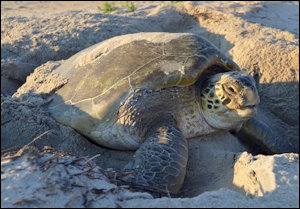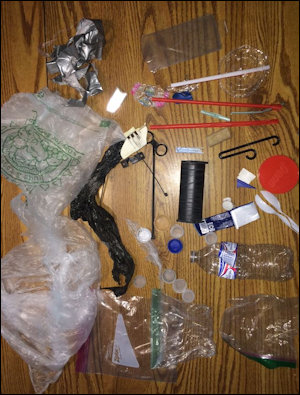
On the evening of June 11, two endangered Loggerhead sea turtles crawled out of the ocean and wriggled up the sand at Virginia Beach. One dug a hole, laid 150-eggs and covered them with sand before returning to sea. The eggs had to be carefully relocated by human intervention to a safer nesting spot. In about 60-days, these eggs should hatch, and the baby loggerheads will instinctively head out to the Gulf Stream to mature, taking a giant “lazy river” ride, circulating repeatedly to the other side of the Atlantic and back for more than a decade.
Should they survive, these hatchlings already know that Virginia is for Lovers, since they are biologically encoded to return here to mate and lay their eggs. Virginia however is at the northernmost extent of the Loggerhead range and has only a few sporadic sea turtle nests.
To more closely study Loggerhead survival, our family recently made a scientific journey to prime Loggerhead breeding territory: Hilton Head Island, S.C.
As you’ve probably guessed, this science trip was actually a planned family vacation. However, if you know me well enough, sea turtle health quickly became the vacation sub-plot. We ran the Palmetto Dunes Turtle Trot 5K — albeit at a turtle’s pace– and we attended a naturalist sea turtle seminar.

Additionally, armed with the “knowledge” that plastics litter from thoughtless American consumers in our cities and towns is seriously harming the Loggerhead population, I enlisted my grandchildren’s assistance in picking up all the plastic litter we could find. It was two points for any plastic litter found away from the beach, five points for plastic litter on the sandy beach itself, and 10 points for any plastic litter in the ocean. We lost track of the final score, but we only found one 10-point item: I saved one clear, resealable plastic sandwich bag from floating further away into the the ocean. Parenthetically, I would say plastic sandwich bags were the biggest potential turtle problem that I perceived. According to the turtle naturalists, clear plastic bags resemble jellyfish, a turtle food.
Before I take this essay any further, I need to disclose my blasphemous personal hypothesis. I question whether a single Loggerhead turtle has ever died due to exposure to waste plastics litter from America’a towns. My thesis is that America has very good trash recycling, incineration and landfill programs, and that American consumers are not a significant contributor to the ocean plastics problems we are hearing so much about lately.
My hypothesis above was corroborated at the naturalist’s sea turtle seminar, and also by the behavior of the local community and businesses.
The local naturalist, perhaps lacking adequate political-correctness, indicated it was mainly the Leatherback turtles — not the Loggerheads — who were most impacted by the plastics litter. Confirming that belief, there were many Loggerhead turtle safety signs on the beach enforcing local Loggerhead conservation measures — but plastic litter was not listed as a concern. The local restaurant on the beachfront serves great Pina Coladas, which entailed using many plastic straws… within a few feet of a new Loggerhead egg nest right at their beach entrance.
Kroger apparently switched to paper grocery bags…but why? There are actually single-use plastic bag dispensers right on the beach for dog poop management. Kroger also has tasty, cheap bottled water. Thus, I can assure you Kroger’s good name is often seen on the plastics bottle litter we recovered near the beach.
The local Walmart, somewhat comically for me, has eliminated “single-use” plastic bags by going to thicker plastic grocery bags, which the company claims are good for 125 re-uses. I saw one family leave the Walmart with about 20 of the thicker plastic bags, full of groceries, in their cart. One wonders how they are going to get 125 re-uses out of all of them.
On a charter motorboat ride to see Bottlenose dolphins, the skipper gave us the smaller half-size plastic water bottles. But he cautioned that we need to be very careful because at 25 m.p.h. the strong wind on our faces would easily blow the empty water bottles into the ocean — and that could kill a sea turtle. My young grandson asked the Captain how fast the turtles die after eating a plastic bottle. Was the death slow or rapid? The captain said it was a slow death. I wanted to know (but did not ask), if plastic water bottles kill sea turtles, why the heck is he allowed to serve them on a public speedboat on turtle-sensitive Hilton Head Island? Needless to say, we went without the bottled water.
Notwithstanding the apparent confused plastics management message that I observed above, we witnessed an apparent healthy Loggerhead turtle population at Hilton Head. More than five Loggerhead nests were marked off in close proximity to our entrance walkway to the beach. To date, Hilton Head’s 2019 total turtle nest count is already over 200 and climbing, making 2019 the record high year if the trend continues. About 430 nests was the Island’s prior record high. By comparison, Florida, the leading U.S. nesting spot, has tens of thousands of Loggerhead nests.
Usually the same female turtle lays three or four nests during the summer, and then she takes well-deserved a two- or three-year vacation to recover. Thus our home grown Loggerhead nest at Virginia Beach quite possibly belongs to the same individual who laid a nest at Virginia Beach several years ago. Believe it or not, the Virginia naturalists plan to conduct a DNA test to confirm that the 2019 Virginia Beach Loggerhead is this same individual female. We also might expect a few more nests this year, from this same female.
Loggerhead turtles face a hard knock life. Only one in a thousand hatchlings are estimated to survive to adulthood. Up to 40% of the adult nesting females have apparent shark bite injuries — judging by a distinctive sand pattern left on the beach, one Hilton Head turtle is missing a leg. Many are killed in fishing nets. Many are killed by motorboats. Sea turtles need a quiet, undisturbed beach area, including no bright lights on beach houses after 10 p.m. Therefore, habitat loss is a serious problem. A single raccoon on the beach can reportedly wipe out a vast number of nests. In other countries, the eggs and turtles are eaten by humans, and the turtles are not protected by american-style strict conservation measures.
Just as we were leaving Hilton Head, the TV news reported on a proposed law to ban garden shovels on the beach. The law would “send a message,” the report said, that deep holes in the sand and sand castles left standing are very bad for sea turtles.
I was expecting to hear more about single-use plastic bans. According to one study, at least 50% of Loggerheads have ingested plastics, but the study was not saying the plastics were fatal. I do not question that plastics pollution in the ocean is a problem for the world. I do wonder if those plastics come from America’s cities.
I departed Hilton Head with the impression that America’s Atlantic shore Loggerhead turtle population is thriving, thanks to to our excellent conservation measures. Of course, Loggerhead populations in other parts of the world are undoubtedly more endangered.
I am left with several moral, practical questions. Are single-use plastics from American towns really seriously hurting the Loggerhead sea turtle population? If not, does it make sense to ban plastics in America to “send a message,” even if we are handling the waste disposal problem well enough ourselves? Is the long-term persistence of mismanaged plastic waste (litter) so bad that many beneficial uses of plastics have to end?

Leave a Reply
You must be logged in to post a comment.